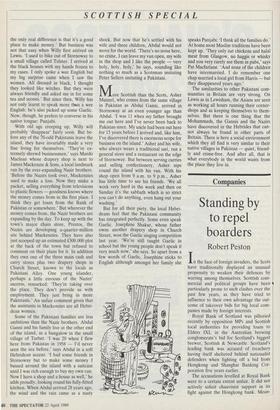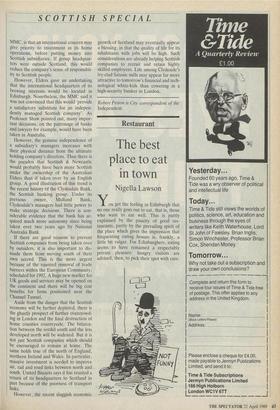Companies
Standing by to repel boarders
Robert Peston
In the face of foreign invaders, the Scots have traditionally displayed an unusual propensity to weaken their defences by warring among themselves. Scottish com- mercial and political groups have been particularly prone to such clashes over the past few years, as they have tried to influence to their own advantage the out- come of takeover bids for big local com- panies made by foreign interests.
Royal Bank of Scotland was pilloried recently by opposition MPs and Scottish local authorities for providing loans to Elders IXL in the Australian brewing conglomerate's bid for Scotland's biggest brewer, Scottish & Newcastle. Scotland's leading bank was accused of treachery having itself sheltered behind nationalist defenders when fighting off a bid from Hongkong and Shanghai Banking Cor- poration five years earlier. The accusations levelled at Royal Bank were to a certain extent unfair. It did not actively solicit chauvinist support in its fight against the Hongkong bank. Mean-
SCOTTISH SPECIAL
while, Royal Bank believed its reputation as an international bank would be dam- aged if it turned down business from an established customer, Elders, on political grounds. However, it manifested the typic- al schizophrenia of a Scottish institution on this issue by simultaneously writing to the Monopolies and Mergers Commission, urging that S&N's management be re- tained in Scotland. This was an implicit recognition that there are sound commer- cial reasons for solidarity among Scottish institutions: Royal Bank needs a strong base of locally based customers.
Indeed even the definition of 'Scottish' has been subject to dispute within Scot- land. In a world where there are few barriers to movements of capital, own- ership is not a good test of the Scottishness of a publicly quoted company, such as Scottish & Newcastle. Shares in the brew- ery group are held by Scottish investment institutions, but also by English, American and Japanese investors. Moreover, there are no obstacles to the constant change in the national composition of those inves- tors.
In those circumstances, can it be said to matter whether an Australian public com- pany like Elders, whose base of sharehol- ders is also in constant flux, should acquire. such a Scottish company? If Scottishness is important, it is because of the effect the company has on the economy and cultural life of Scotland. Therefore the only impor- tant test of Scottishness is whether a company's strategic decisions are taken in Scotland. As a rule of thumb, a company is Scottish if its corporate headquarters are in Scotland.
Scottish & Newcastle passes this test — most of its key executives are based in Scotland. So did Coats Patons, the world- leading Scottish thread producer, which was taken over by David Alliance's Vanto- na Viyella. But other companies, the takeovers of which outraged the Scottish lobby, were less worthy of defence on nationalist grounds.
Guinness's controversial takeover of Distillers, Scotland's biggest whisky pro- ducer, is a good example of sentiment displacing reason among those lobbying for the bid to be blocked on nationalist grounds. A similar case was BP's acquisi- tion of Britoil, the largest oil company north of the border. Both Britoil and Distillers were nominally Scottish, in that they maintained their registered offices in Scotland. But the company's most power- ful directors lived and worked in England.. In the words of Professor Jack Shaw, executive director of the influential consul- tancy Scottish Financial Enterprise, the Companies' patronage was dispensed in England. Thus the most powerful of Scottish businessmen, Sir Hector Laing, cannot be said to run a Scottish company, although he does claim Caledonian credentials for United Biscuits of which he is chairman. One of his first acts when becoming chief executive of the biscuits group, in 1964, was to shift the corporate headquarters from Scotland to London, although the cosmetic registered office is maintained in Edinburgh. This probably explains why Sir Hector reserves most of his brimstone for corporate raiders from across the North Sea, rather than bidders from south of the Tweed.
Southerners may be tempted to dismiss Scottish opposition to English and overseas takeovers as illiberal chauvinism. National- ism is indeed waxing across the border. However there are strong public interest reasons for slowing down the flow of bids from outsiders for Scottish companies. This would benefit Britain as a whole, not just Scotland.
Last month the Monopolies and Mergers Commission did indeed block Elders' £1.6 billion offer for S&N. However, the MMC's decision was based mainly on the view that a merger of the two companies would be expected to have serious adverse effects on competition in the UK brewing industry as a whole. The effect of the takeover on the Scottish economy was treated as a matter of secondary import- ance.
It was nonetheless encouraging that the MMC took note of arguments that the loss of S&N's independence would have far- reaching effects outside the brewing indus- try. If S&N were taken over by a foreign group, there was a great danger that many head office functions would be transferred outside Scotland. This would mean a loss of high quality jobs in marketing, manage- ment and research for the local commun- ity, with damaging long-term effects on the region's ability to retain highly trained individuals. At the same time, Elders might have tried to save costs, as most successful bidders do, by reducing the number of outside firms supplying services to the combined businesses. So the takeov- er of S&N could have meant the loss of important patronage and revenue for Scot- tish banks, pension fund managers, insur- ance companies, accountants and lawyers. Such consequences have certainly stem- med from takeovers of other Scottish companies.
Another concern, not addressed by the
SCOTTISH SPECIAL
MMC, is that an international concern may give priority to investment in its home operations, before putting money into Scottish subsidiaries. If group headquar- ters were outside Scotland, this would reduce the company's sense of responsibil- ity to Scottish people.
However, Elders gave an undertaking that the international headquarters of its brewing interests would be located in Edinburgh. Nonetheless, the MMC said it was not convinced that this would 'provide a satisfactory substitute for an indepen- dently managed Scottish company'. As Professor Shaw pointed out, many impor- tant decisions, on the patronage of banks and lawyers for example, would have been taken in Australia.
However, the genuine independence of a subsidiary's managers increases with their physical distance from the ultimate holding company's directors. Thus there is the paradox that Scottish & Newcastle Would probably have been more Scottish under the ownership of the Australian Elders than if taken over by an English group. A good illustration of this trend is the recent history bf the Clydesdale Bank, the Scottish banking group. Under its previous owner, Midland Bank, Clydesdale's managers had little power to make strategic decisions. There is con- siderable evidence that the bank has ac- quired much more autonomy since being taken over two years ago by National Australia Bank.
If there are good reasons to prevent Scottish companies from being taken over by outsiders, it is also important to dis- suade them from moving south of their own accord. This is the more urgent because of the vaunted removal of trade barriers within the European Community, scheduled for 1992. A huge new market for UK goods and services may be opened on the continent and there will be big cost benefits for firms positioned near the Channel Tunnel.
Aside from the danger that the Scottish economy will be further depleted, there is the ghastly prospect of further overcrowd- ing in London and the final destruction of home counties countryside. The bifurca- tion between the sordid south and the less developed north will be widened. But it is not just Scottish companies which should be encouraged to remain at home. The same holds true of the north of England, northern Ireland and Wales. In particular, massive investment is needed to improve air, rail and road links between north and south. United Biscuits says it has resisted a return of its headquarters to Scotland in Part because of the poorness of transport links.
However, the recent sluggish economic growth of Scotland may eventually appear a blessing, in that the quality of life for its inhabitants with jobs will be high. Such considerations are already helping Scottish companies to recruit and retain highly skilled employees. Life among Clydeside's ivy-clad Satanic mills may appear far more attractive to tomorrow's financial and tech- nological whizz-kids than cowering in a high-security bunker in London.
Robert Peston is City correspondent of the Independent.




































































 Previous page
Previous page